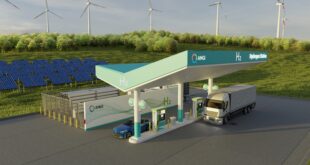HARRISBURG, Pa., Feb. 1 /PRNewswire-USNewswire/ — Citing the urgent
need to cut energy costs, move toward energy independence and stimulate the
economy, Governor Rendell today released his Energy Independence Strategy.
The plan will push Pennsylvania into the top tier of states taking steps to
cut consumer energy costs, and significantly expand the alternative fuel,
clean energy and conservation sectors.
‘This plan will cut Pennsylvanians’ energy bills by $10 billion over
the next 10 years,’ said Governor Rendell. ‘It will give us the ability to
produce enough homegrown fuel to replace every gallon Pennsylvania
currently imports from the Persian Gulf.
‘With smart policies and aggressive leadership, we have attracted
hundreds of millions of dollars of new investment and created thousands of
new jobs, making us a leader in the clean energy sector. The new policies I
am proposing will grow our competitive edge in clean energy even further
and move us dramatically closer to energy independence.’
The enactment of new laws, regulatory policies and the creation of the
$850 million Energy Independence Fund will enable Pennsylvania to achieve
three key goals:
* Save consumers $10 billion in energy costs over the next 10 years;
* Reduce Pennsylvania’s reliance on foreign fuels and increase
Pennsylvania’s clean energy production capacity; and
* Expand Pennsylvania’s energy production and energy technology sectors
to create more jobs.
Cut Consumer Utility Bills
The first priority for this new energy initiative is to cut energy
costs for Pennsylvania consumers. Electric generation rates can swing
wildly during the course of the day and at different times of year. A
recent study by PJM, the independent electricity grid operator that covers
Pennsylvania, showed that cutting power consumption by just 3-5 percent
during peak rate periods saves consumers across the state up to $230
million annually.
‘At times of high energy use, such as the hottest days of the summer
and coldest days of the winter, energy costs can be five- to seven-times
higher than during times of moderate use,’ said Governor Rendell. ‘Today we
do not have the tools to cut our energy bills by shifting energy use to
times when costs are lower. I want to help consumers save money through
smart metering and time-of-day rate structures.’
The Governor’s initiative enables consumers to be smart about energy
use by providing new tools to empower consumers and $244 million in new
funding to help them install state-of-the-art energy technology.
Smart Metering: The Energy Independence Strategy would give consumers
the right to get smart meters installed in their home to give them a
new tool to reduce energy spending. Utilities would be required to
prove they have aggressively pursued this strategy before getting
approval to build new generating plants.
Increase Household Energy Efficiency and Lower Bills: Rebates would
be provided for customers turning in old, inefficient air conditioners
and refrigerators – two of the biggest energy-using appliances in the
home – for new models that use at least 15 percent less energy. The
creation of a ‘Pennsylvania Sunshine’ program will help residents pay
for up to 50 percent of the cost of installing solar panels on their
home or small business. At current electricity rates, the average
household could save about $600 a year with a 5 kW system, or solar
panels that generate about two-thirds of the electricity consumed in
the home.
Make Pennsylvania Businesses More Competitive: To stay in business in
our state, industry needs affordable electricity and rates that
remain relatively stable. Soaring or dramatically fluctuating
electricity costs make it difficult to manage and grow a business.
That is the situation manufacturers in Pennsylvania face as rate caps
end and they are left to deal with rapidly changing, ‘spot market,’
electricity prices.
The Energy Independence Strategy addresses this problem for
Pennsylvania by enabling large energy consumers to enter into
longer-term contracts with stable, cheaper prices with their
electricity provider, or through ‘microgrids’ to generate their own
power. Second, electricity providers would have to demonstrate they
sought to keep prices down by buying a portfolio of electricity
resources at wholesale through long and short contracts, instead of
just spot market deals.
Power generators and distributors also are required to invest in
conservation first – initiatives that help customers cut energy
consumption – rather than in costlier options like building new
generation or buying power at peaking rates.
‘Investing in conservation is critically important and the alternative
is unacceptable,’ said Governor Rendell. ‘Without this initiative,
Pennsylvanians will need to build the equivalent of five large nuclear
or coal-fired power plants at a cost of over $10 billion to meet our
growing demand for electricity over the next 15 years.’
Reducing Reliance on Foreign Sources of Fuel
‘Every year, Pennsylvanians send some $30 billion out of our state just
to buy gas and liquid fuels,’ the Governor said. ‘We need to keep those
dollars at home and put our own people to work building our state’s energy
independent future.
‘I have made a priority of investing in farm land and open space
preservation, and I am proud to say Pennsylvania now has the biggest
program in the country. But even with this effort, we still lose three
acres of farmland for every acre we save. If we give our farmers a chance
to grow our energy, we can turn that around and help our farming families
while we bolster our energy security.’
The commonwealth is already a leader in the production of renewable
fuels. One of the largest ethanol plants in the east will be built in the
state, and approximately 340 million additional gallons of ethanol
production are planned. Similarly, companies in Pennsylvania are expected
to produce 60 million gallons of biodiesel by the end of 2007, and other
new plants being built are expected to produce an additional 170 million
gallons within the next two years. To put that into perspective, current
national production of biodiesel amounts to 225 million gallons, putting
Pennsylvania’s total production near the top of all states.
Enact PennSecurity Fuels Standards: To guarantee that the shift to
cleaner alternative fuels occurs, and to bring economic stability to
the alternative fuels sector in PA, the Energy Independence Strategy
will codify the ‘PennSecurity Fuels Initiative’ by requiring that we
grow and use one billion gallons of clean and renewable fuels. One
billion gallons of biofuel represents about 12.5 percent of all fuel
consumption in the state, and by 2017, would equal approximately the
amount of fuel Pennsylvanians buy from the Persian Gulf. Instead of
spending $30 billion to pay for foreign sources of fuel, more of these
funds will be spent purchasing fuel from Pennsylvania’s companies and
farmers.
Specifically, the Governor’s initiative would mean that every gallon
of gasoline sold in Pennsylvania would include 10 percent ethanol, and
every gallon of diesel would include an increasing amount (up to 20
percent) of soy or other renewable oil.
Expand Pennsylvania’s Energy Production Companies/Jobs
Governor Rendell has successfully attracted some of the world’s leading
advanced energy companies to Pennsylvania. Clean energy is among the
fastest growing investment sectors in the U.S. and global economy. In the
last five years alone, investors have pumped $24 billion into clean energy
projects – a two-fold increase over previous investment levels.
‘I am determined to further grow the Pennsylvania economy by attracting
energy companies to the state, creating jobs, and by making the
commonwealth the ‘destination location’ for clean energy investors,’ said
Governor Rendell.
‘Pennsylvania’s current energy investment programs have created over
2,500 jobs in the commonwealth, but since funding dollars are limited, the
state is only able to support 10 percent of requests for energy dollars –
losing out on at least $100 million in potential investments every year,’
said Governor Rendell.
To ensure that Pennsylvania’s economy and our jobs are benefiting from
the national growth in this sector, the Energy Independence Fund will:
* Accelerate the role that Pennsylvania companies play in the
production of clean energy components and systems: By making over
$100 million available in the form of venture capital, loans and
grants so Pennsylvania firms can attract private sector investors and
grow their companies. These funds may also assist in attracting
cutting-edge energy firms to the commonwealth. All state funds will
be matched at least dollar-for-dollar by private sector capital.
* Initiate Clean Energy Economic Development Projects: New state
resources will target up to $500 million in state funds dedicated for
infrastructure improvements, construction, early project development
costs and equipment purchases undertaken to attract private
investment in energy-related economic development projects, including
solar manufacturing; advanced coal technologies; biofuels; and energy
conservation, efficiency, and energy demand management projects.
* Keep Energy Jobs Close To Home: The plan also makes improvements to
the historic Alternative Energy Portfolio Standard already on the
books in Pennsylvania. It makes clear that power companies can enter
into long-term contracts with the developers of wind farms and solar
power arrays so that those new and clean sources of energy can get
financed and built. And this strategy also makes clear that those
projects have to get built in a place that directly supports the grid
that serves Pennsylvanians; renewable projects built in other parts
of the country or even Canada would not be used to meet our
requirements.
Climate Change
‘I think everyone now understands that you cannot deal with energy
policy without addressing global warming,’ said Governor Rendell. ‘It is
the largest environmental problem we face and Pennsylvania needs to do
something about it.
‘The efforts I am announcing today to save energy and produce more
clean energy are a good first step, but they are only a first step. In the
next 90 days I will present a comprehensive strategy to make Pennsylvania a
leader in addressing climate change.’
The Energy Independence Fund
The Energy Independence Fund will be used to support the following
clean energy activities:
* $244 million – Household appliance rebates and PA Sunshine Grants
* $106 million – Venture capital, grants and loans for expansion of
energy companies
* $500 million – Clean energy projects and development or equipment
costs for specific energy economic development projects
The Energy Independence Fund will be capitalized by a systems benefits
charge on electric power consumers. Charges of this kind are already in
place in 15 states and the District of Columbia. At the rate proposed,
Pennsylvania’s charge would be lower than all but two of these
jurisdictions.
The systems benefits charge is proposed at $0.0005 per kWh of
electricity used (five-hundredths-of-a-cent or .5 mills). This charge would
cost the average residential customer 45 cents per month, the average
commercial customer about $3.00 per month and the average industrial
customer $74 per month. For large industrial customers, the fee would be
capped at a maximum of $10,000 per year.
By contrast, the Energy Independence Strategy as a whole is expected to
save consumers nearly 15 times more than the cost of this fee. The average
residential customer is expected to save $73 per year, the average
commercial customer $425 per year, and the average industrial customer
$10,500 per year.
The Rendell Administration is committed to creating a first-rate public
education system, protecting our most vulnerable citizens and continuing
economic investment to support our communities and businesses. To find out
more about Governor Rendell’s initiatives and to sign up for his weekly
newsletter, visit his Web site at: http://www.governor.state.pa.us.
SOURCE Pennsylvania Office of the Governor
——————————————————————————–
Related links:
http://www.governor.state.pa.us
Energy
 Alternative Energy HQ solar power for homes, wind energy, and bio fuel issues
Alternative Energy HQ solar power for homes, wind energy, and bio fuel issues






